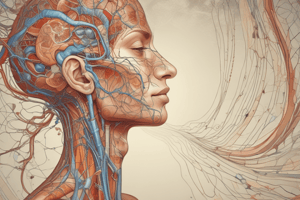Podcast
Questions and Answers
What is the scientific study of the functions and processes that occur within living organisms?
What is the scientific study of the functions and processes that occur within living organisms?
- Biology
- Physiology (correct)
- Biochemistry
- Anatomy
Which branch of physiology studies the functions and processes of plants?
Which branch of physiology studies the functions and processes of plants?
- Plant physiology (correct)
- Human physiology
- Microbial physiology
- Animal physiology
At which level of organization does physiology study the functions of biomolecules?
At which level of organization does physiology study the functions of biomolecules?
- Molecular level (correct)
- Cellular level
- Organ level
- Tissue level
What is the process of maintaining a stable internal environment despite changes in the external environment?
What is the process of maintaining a stable internal environment despite changes in the external environment?
Which physiological system is responsible for transmitting and processing information?
Which physiological system is responsible for transmitting and processing information?
What is the application of physiology that helps diagnose and treat diseases?
What is the application of physiology that helps diagnose and treat diseases?
Which physiological process is the breakdown and synthesis of nutrients to produce energy and organic compounds?
Which physiological process is the breakdown and synthesis of nutrients to produce energy and organic compounds?
What is the level of organization that physiology studies the functions of organs?
What is the level of organization that physiology studies the functions of organs?
Flashcards are hidden until you start studying
Study Notes
Overview of Physiology
Physiology is the scientific study of the functions and processes that occur within living organisms, including plants, animals, and microorganisms.
Branches of Physiology
- Human physiology: studies the functions and processes of the human body
- Animal physiology: studies the functions and processes of non-human animals
- Plant physiology: studies the functions and processes of plants
- Microbial physiology: studies the functions and processes of microorganisms
Levels of Organization
Physiology studies the functions and processes at various levels of organization, including:
- Molecular level: studies the functions of biomolecules, such as proteins and nucleic acids
- Cellular level: studies the functions of cells, including cellular signaling and metabolism
- Tissue level: studies the functions of tissues, such as muscle and nerve tissue
- Organ level: studies the functions of organs, such as the heart and lungs
- System level: studies the functions of organ systems, such as the circulatory and nervous systems
- Organism level: studies the functions of the entire organism
Physiological Processes
Some of the key physiological processes include:
- Metabolism: the breakdown and synthesis of nutrients to produce energy and organic compounds
- Homeostasis: the maintenance of a stable internal environment despite changes in the external environment
- Regulation: the control of physiological processes, such as heart rate and blood pressure, to maintain homeostasis
- Response to stimuli: the response to internal or external stimuli, such as pain or light
Physiological Systems
Some of the key physiological systems include:
- Nervous system: responsible for transmitting and processing information
- Circulatory system: responsible for transporting oxygen and nutrients to cells and removing waste products
- Respiratory system: responsible for exchanging oxygen and carbon dioxide
- Digestive system: responsible for breaking down and absorbing nutrients
- Endocrine system: responsible for producing and regulating hormones
Applications of Physiology
Physiology has many applications in various fields, including:
- Medicine: understanding physiological processes can help diagnose and treat diseases
- Sports and exercise: understanding physiological processes can help improve athletic performance
- Environmental science: understanding physiological processes can help understand how organisms respond to environmental changes
- Agriculture: understanding physiological processes can help improve crop yields and agricultural productivity
Overview of Physiology
- Scientific study of functions and processes within living organisms, including plants, animals, and microorganisms
Branches of Physiology
- Human physiology: studies human body functions and processes
- Animal physiology: studies non-human animal functions and processes
- Plant physiology: studies plant functions and processes
- Microbial physiology: studies microorganism functions and processes
Levels of Organization
- Physiology studies functions and processes at:
- Molecular level: biomolecules, such as proteins and nucleic acids
- Cellular level: cellular signaling and metabolism
- Tissue level: muscle and nerve tissue
- Organ level: heart and lungs
- System level: circulatory and nervous systems
- Organism level: entire organism functions
Physiological Processes
- Metabolism: breakdown and synthesis of nutrients for energy and organic compounds
- Homeostasis: maintaining a stable internal environment
- Regulation: controlling physiological processes for homeostasis
- Response to stimuli: responding to internal or external stimuli
Physiological Systems
- Nervous system: transmits and processes information
- Circulatory system: transports oxygen and nutrients to cells and removes waste products
- Respiratory system: exchanges oxygen and carbon dioxide
- Digestive system: breaks down and absorbs nutrients
- Endocrine system: produces and regulates hormones
Applications of Physiology
- Medicine: understanding physiological processes helps diagnose and treat diseases
- Sports and exercise: understanding physiological processes improves athletic performance
- Environmental science: understanding physiological processes helps understand organism responses to environmental changes
- Agriculture: understanding physiological processes improves crop yields and agricultural productivity
Studying That Suits You
Use AI to generate personalized quizzes and flashcards to suit your learning preferences.




